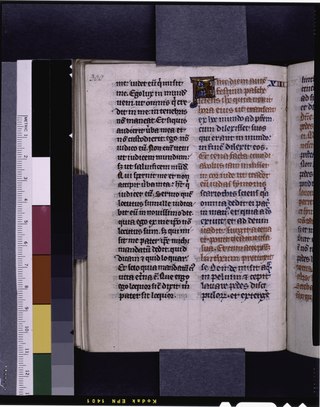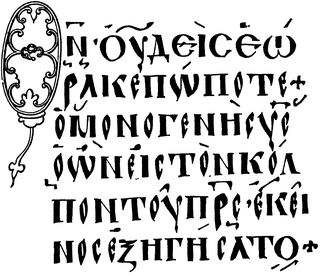| John 1:6 | |
|---|---|
← 1:5 1:7 → | |
 John 1:1–16 in Papyrus 75 (AD 175–225) | |
| Book | Gospel of John |
| Christian Bible part | New Testament |
John 1:6 is the sixth verse in the first chapter of the Gospel of John in the New Testament of the Christian Bible.
| John 1:6 | |
|---|---|
← 1:5 1:7 → | |
 John 1:1–16 in Papyrus 75 (AD 175–225) | |
| Book | Gospel of John |
| Christian Bible part | New Testament |
John 1:6 is the sixth verse in the first chapter of the Gospel of John in the New Testament of the Christian Bible.
In the original Greek according to Westcott-Hort, this verse is:
In the King James Version of the Bible the text reads:
The New International Version translates the passage as:
The New Living Translation identifies John as "John the Baptist". [1]
Irish Archbishop John McEvilly reflects that the object of John here seems to be to correct a prevailing error that the Baptist was the Messiah (Luke 3:15; John 1:19). While doing this he refers to John, who was commonly thought to be a Prophet (Matthew 21:26), as a key witness to prove that Jesus was the Christ, "the Son of God", for this was the chief aim of this gospel (John 20:31). [2] Henry Alford suggests that "sent by God" may refer back to Malachi 3:1: Behold, I send My messenger. [3]
Augustine: "What is said above, refers to the Divinity of Christ. He came to us in the form of man, but man in such sense, as that the Godhead was concealed within Him. And therefore there was sent before a great man, to declare by his witness that He was more than man. And who was this? He was a man." [4]
Theophylact of Ohrid: "Not an Angel, as many have held. The Evangelist here refutes such a notion." [4]
Augustine: "And how could he declare the truth concerning God, unless he were sent from God." [4]
Chrysostom: "After this esteem nothing that he says as human; for he speaketh not his own, but his that sent him. And therefore the Prophet calls him a messenger, I send My messenger, (Mal. 3:1) for it is the excellence of a messenger, to say nothing of his own. But the expression, was sent, does not mean his entrance into life, but to his office. As Esaias was sent on his commission, not from any place out of the world, but from where he saw the Lord sitting upon His high and lofty throne; (Isai. 6:1.) in like manner John was sent from the desert to baptize; for he says, He that sent me to baptize with water, the same said unto me, Upon Whom thou shalt see the Spirit descending, and remaining on Him, the same is He which baptizeth with the Holy Ghost. (John 1:33)" [4]
Augustine: "What was he called? whose name was John?" [4]
Alcuin: "That is, the grace of God, or one in whom is grace, who by his testimony first made known to the world the grace of the New Testament, that is, Christ. Or John may be taken to mean, to whom it is given: because that through the grace of God, to him it was given, not only to herald, but also to baptize the King of kings." [4]

Matthew 3:1 is the first verse of the third chapter of the Gospel of Matthew in the New Testament. This verse takes up the narrative some thirty years after Matthew 2:23, beginning the account of Jesus' ministry. This verse introduces the figure of John the Baptist.

John 1 is the first chapter in the Gospel of John in the New Testament of the Holy Bible.

John 3 is the third chapter of the Gospel of John in the New Testament of the Christian Bible. It deals with Jesus' conversation with Nicodemus, one of the Jewish pharisees, and John the Baptist's continued testimony regarding Jesus. Baptist preacher Charles Spurgeon said of this chapter that it is the one he would choose "to read to a dying man who did not know the gospel, [as] the most suitable one for such an occasion".

John 4 is the fourth chapter of the Gospel of John in the New Testament of the Christian Bible. The major part of this chapter recalls Jesus' interaction with the Samaritan woman at the well in Sychar. In verses 43-54, he returns to Galilee, where he heals a royal official's son.
Matthew 16 is the sixteenth chapter in the Gospel of Matthew in the New Testament section of the Christian Bible. Jesus begins a journey to Jerusalem from the vicinity of Caesarea Philippi, near the southwestern base of Mount Hermon. Verse 24 speaks of his disciples "following him".

John 13 is the thirteenth chapter of the Gospel of John in the New Testament of the Christian Bible. The "latter half", "second book", or "closing part" of John's Gospel commences with this chapter. The nineteenth-century biblical commentator Alexander Maclaren calls it "the Holy of Holies of the New Testament" and the "most sacred part of the New Testament", as it begins John's record of the events on the last night before the crucifixion of Jesus Christ, emphasising Jesus' love for His disciples, demonstrated in the service of washing their feet, and His commandment that they love one another in the same way. The author of the book containing this chapter is anonymous, but early Christian tradition uniformly affirmed that John composed this Gospel.
Matthew 11:10 is the tenth verse in the eleventh chapter of the Gospel of Matthew in the New Testament.
Matthew 11:9 is the ninth verse in the eleventh chapter of the Gospel of Matthew in the New Testament.

John 1:29 is the twenty-ninth verse in the first chapter of the Gospel of John in the New Testament of the Christian Bible.

John 1:9 is the ninth verse in the first chapter of the Gospel of John in the New Testament of the Christian Bible.

John 1:19 is the nineteenth verse in the first chapter of the Gospel of John in the New Testament of the Christian Bible.

John 1:20 is the twentieth verse in the first chapter of the Gospel of John in the New Testament of the Christian Bible.

John 1:25 is the twenty-fifth verse in the first chapter of the Gospel of John in the New Testament of the Christian Bible.

John 1:30 is the 30th verse in the first chapter of the Gospel of John in the New Testament of the Christian Bible.

John 1:33 is the 33rd verse in the first chapter of the Gospel of John in the New Testament of the Christian Bible.

John 1:40 is the 40th verse in the first chapter of the Gospel of John in the New Testament of the Christian Bible. It states that Andrew was a disciple of John the Baptist.
John 1:21 is a verse in the first chapter of the Gospel of John in the New Testament.

John 1:43 is the 43rd verse in the first chapter of the Gospel of John in the New Testament of the Christian Bible.

Matthew 11:2–3 are the second and third verses in the eleventh chapter of the Gospel of Matthew in the New Testament.
Matthew 12:17-18 are two verses in the twelfth chapter of the Gospel of Matthew in the New Testament.
| Preceded by John 1:5 | Gospel of John Chapter 1 | Succeeded by John 1:7 |